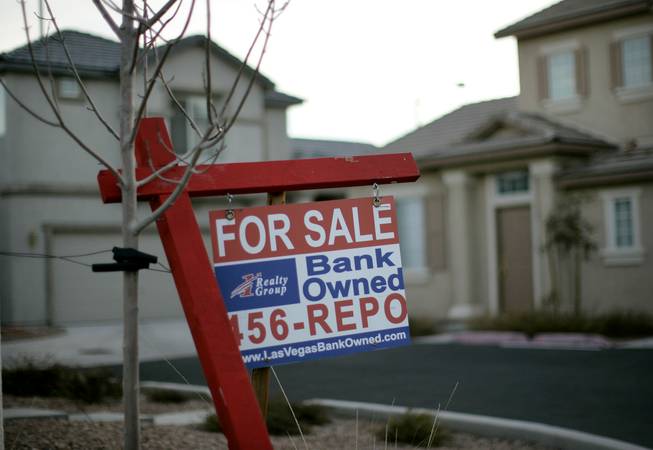
Jae C. Hong / AP
In this Feb. 8, 2008, file photo, a for-sale sign stands in front of a bank-owned home in Las Vegas.
Friday, March 2, 2012 | 2 a.m.
Sun Archives
When homeowners headed for foreclosure sit down with their bank to see if they can work out an agreement, state law requires the lender come equipped with documents proving who owns the home, among other things. In one-third of those mediation meetings, however, banks failed to produce the required documents, according to an analysis of the last six months of 2011.
The figures appear to provide statistical evidence to support what many homeowners have claimed — that banks aren’t negotiating in good faith to help them stay in their houses.
JP Morgan Chase had the highest rate of noncompliance with the state law. It failed to produce required documents in 52 percent of mediations, which homeowners may request before a bank forecloses. The figures were released Thursday by the state’s Foreclosure Mediation Program.
Bank of America, by far the biggest private lender in Nevada, did not produce the necessary documents 41 percent of the time.
Overall, out of the 3,183 mediations from July 1 to Dec. 31, lenders were missing documents on 1,148 occasions, or 36 percent of the time.
“The noncompliance rate since the beginning of the program has been shockingly high,” said Barbara Buckley, head of the Legal Aid Center of Southern Nevada and the former Assembly speaker who authored the foreclosure mediation bill. “I had hoped by now that the lenders would begin complying.”
Bill Uffelman, president of the Nevada Bankers Association, said “the numbers speak for themselves.”
“The fact that they’re missing required documents, produced somewhere along the life of the loan, indicates insufficient record keeping,” he said.
Representatives of the banks could not be reached after the figures were released.
The state’s Foreclosure Mediation Program started in September 2009 was intended to allow homeowners to sit down with their lender before going through foreclosure. It does not force banks to make any concessions but it does require they do the following:
• Show up at mediation sessions.
• Bring documents, such as a certified copy proving ownership and a chain of title.
• Have the authority to negotiate on behalf of the lender.
• Participate “in good faith,” as determined by the mediator, who is appointed by the Nevada court system.
When the program started, it struggled to get bank representatives to show up at all, said Verise Campbell, administrator of the program. In the last six months of 2011, banks had representatives present in all but 2 percent of mediation sessions.
Despite the large percentage of sessions where banks have not shown up with documents, it is an improvement compared with the early years of the program. Lenders failed to bring documents in 50 percent of the cases during the first two years of the program, Campbell said.
The numbers released Thursday show “improvement, but banks still need to focus on their document compliance,” Campbell said. “It’s clearly the weak link in their compliance.”
The numbers provided the first look at participation by lending institution. In addition to Bank of America and JP Morgan Chase, the report gave the rate of not bringing required paperwork for the following lenders: Wells Fargo, 31 percent; Ally/GMAC, 50 percent; US Bank, 32 percent; Citigroup, 12 percent.
Transparency about which lenders are complying and which ones aren’t could compel those noncompliant banks to produce documents, Buckley said.
The courts could use these statistics to issue fines against banks that fail to comply with the state program, Buckley said.
Lenders who don’t comply with the program “don’t deserve to proceed with foreclosures,” she said.

Join the Discussion:
Check this out for a full explanation of our conversion to the LiveFyre commenting system and instructions on how to sign up for an account.
Full comments policy